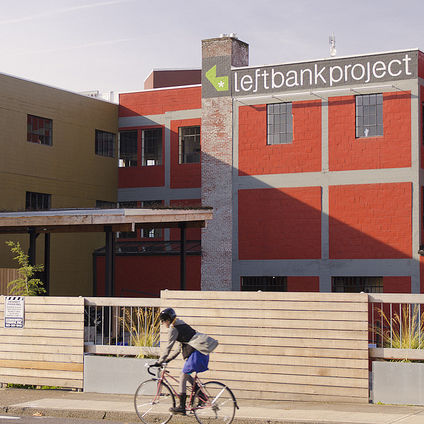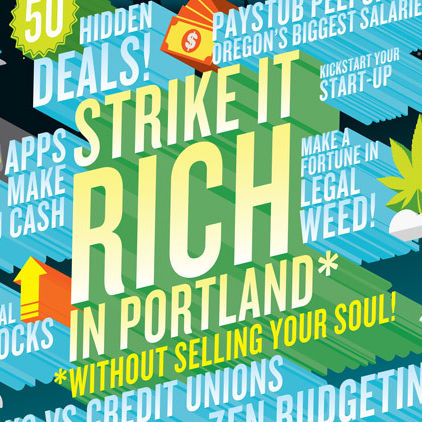What the New York Times Got Wrong About Portland

Image: Matthew Hollister
“Will Portland Always Be a Retirement Community for the Young?”
Beneath this September headline, New York Times writer Claire Cain Miller reported a troubling scenario: “Portland has more highly educated people than it knows what to do with.” As her main character, Miller cast an unemployed, kombucha-loving graphic designer supported by his barista wife. (Journalistic gold!) The story went on to cite Portland’s income growth (anemic) and the earnings of its degree-holding citizens (41st out of 50 big cities). Basically, the story portrayed Portland as a hipster Potemkin village, overstocked with credentialed liberal artists.
Naturally, this severely annoyed many Portlanders. “If you stand out from the crowd, you’re likely to be cut down,” reflects economist Joe Cortright, who rebutted the piece on the Atlantic’s Citylab site. “What’s different draws ridicule—and/or pride.”
Yes, the old Portland money question: Why do smart people move here, even stay here, when they could earn more elsewhere? Whenever the city’s financial life becomes the topic at hand this mystery arises. But this story’s endurance has as much to do with broader society’s anxieties and fascinations as with life on the ground.
“You often hear that attracting talent is everything,” says Aaron Renn, Indianapolis-based creator of the blog Urbanophile. “Many places also fear that smart young people will move away to somewhere cooler. Portland speaks to both those notions. That will naturally provoke backlash.”
“People move to other places all the time,” says Greg Schrock, a Portland State University economist whose research on income the Times article cited. “But here it’s so visible—you run into someone who just moved here every day.” And Schrock’s research with colleague Jason Jurjevich confirmed at least this much of Miller’s story: “People do likely accept less money to live here.”
But this is not news. Historian Terrence O’Donnell wrote long ago that “Seattle and San Francisco were founded by people looking for gold; Portland, by people searching for Eden.” That DNA makes an easy target for either celebration or derision. “Journalists focus on visible signs,” Cortright says, “which means stories about hipsters, baristas, bikers, and artisanal creatives.”
That stuff is fun, but provides a very limited view of Portland’s actual economy. For instance, it’s entirely likely that the free-and-easy New York Times character will get with the program and do, well, something: his own food cart or design firm or tech start-up. “Portland’s entrepreneurialism is real,” Schrock says; his research shows Portland’s educated residents about 50 percent more likely to start their own businesses than counterparts elsewhere.
And cultural anthropology among our fun-employed creatives ignores the huge moves and large-scale trends shaping the city. Our port—the nation’s third-biggest wheat export depot and the proposed site of a $500 million terminal to ship Canadian propane—rarely appears as a subject alongside laptop-tapping flex-lancers. The census counts just 14,000 Portlanders in the “arts, design, entertainment, sports, and media.” (Yes, Damian Lillard and I are in the same category.) But no one writes essays about the 75,000 Portlanders working in education, health care, and social services, or the 32,000 in “production and transportation.”
“The guy who drives a truck in Portland is not a story,” Renn observes.
But that’s just it: Portland’s peculiar economy is a fusion of big and little, quirky and mundane, of issues universal (retirement, investment, punching the clock) and things that couldn’t happen anywhere else (like selling stock—in yourself). Scratch our seeming slackers, and you discover red-blooded entrepreneurs. We live in global capitalism, but we have our own take on free enterprise. We’re home to angel investors and Buddhist budgeters. Any one view is just too simple. (Have we mentioned Simple?)
So pound that kombucha. We’re going to dive in.


















